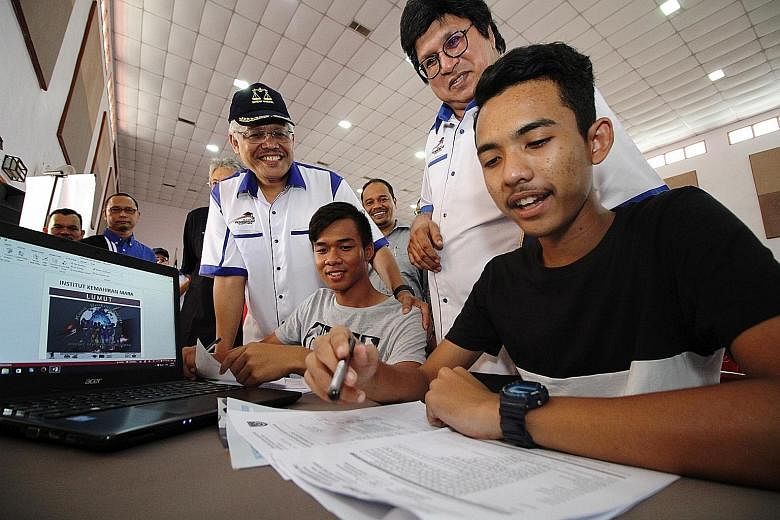Malaysia introduced its affirmative action New Economic Policy (NEP) in 1971 after deadly race riots in 1969, with then Prime Minister Abdul Razak Hussein saying the policy would end in 1990.
The policy was geared towards eliminating poverty and socio-economic restructuring by increasing the wealth of the bumiputera, the poorest demographic. The economic gap between the politically dominant Malays and the Chinese fuelled anger over the ruling Umno's losses, leading to the riots.
But today, 27 years after 1990, no end is in sight for the policy. Worse, the NEP has led to a sense of entitlement among many Malays and their leaders.
By many measurements, the NEP has been a success four decades after the plan was unveiled by Tun Abdul Razak, the father of current Prime Minister Najib Razak.
The government claims to have eradicated poverty and the bumiputera share of the economy has multiplied tenfold even by the most conservative estimates, and the Malay middle class had grown rapidly and is surefooted.
The bumiputera (sons of the soil) consist of the Malays, indigenous Orang Asli and dozens of native tribes in Sabah and Sarawak.
Under the NEP, the bumiputera are given a generous quota to enter public universities, enjoy cheaper housing and get many government facilities to help them in business such as low-cost loans.
-
Key thrusts of KL's affirmative action policy
CORPORATE EQUITY
•Companies listing on the stock exchange were previously required to have the bumiputera owning at least a 30 per cent share. Now only half of a firm's public share offering needs to be reserved for the bumiputera, who can sell their shares after listing.
•Quotas and preferences for bumiputera companies in government tenders.
•Ease of access to financing under various grants and credit schemes.
EDUCATION
Some 55 per cent of places at public universities were reserved for the bumiputera until 2002, when a more merit- based system was introduced. No official quota has been made public for Public Service Department scholarships, but a ratio of 90:10 in favour of the bumiputera has been reported. This was adjusted to 55:45 after 2008.
The government also funds bumiputera-only institutes of higher education and scholarship programmes.
PROPERTY
A housing development must set aside at least 30 per cent of its property units for bumiputera buyers, who are given a minimum 5 per cent discount on the purchase price. This was implemented in the 1980s but as each state can adopt its own land policy, the number of reserved units can reach 70 per cent, while discounts have been as high as 15 per cent.
PUBLIC SERVICE
No formal quota exists for hiring, but a ratio of four bumiputera staff to one non-bumiputera exists for top officers in the home, foreign and police services, and a 3:1 ratio in judicial and legal services. A Cabinet minister in 2006 acknowledged a 10:2:1 ratio of bumiputera, Chinese and Indian intake for public service, an unofficial policy that was known to exist for decades.
But even now, Malaysian Chinese continue to enjoy better salaries and more personal wealth, even if the gap has narrowed.
To its critics, the NEP has been hijacked today by well-connected Malay politicians and their friends to enrich themselves.
Centre for Policy Initiatives chief executive Lim Teck Ghee - whose 2006 paper claimed bumiputera corporate equity had far surpassed the NEP's 30 per cent target - told The Straits Times that the "Chinese bogeyman" is trotted out so that the "gravy train" for Umno's political elite "keeps chugging along".
The government itself admitted that by 2005, the bumiputera had sold off RM52 billion of the RM54 billion worth of shares reserved for them by public-listed companies, instead of reaping the longer-term rewards of capital.
The call for the NEP to be abandoned, or at least tweaked, to ensure that the poor of all ethnicities are helped has fallen on deaf ears in the corridors of power.
In fact, even state-funded Khazanah Research Institute (KRI) found last October that Malaysian Indians - not Malays or the other bumiputera races - had the worst upward mobility.
It also showed a gender gap - sons are 3.6 times more upwardly mobile than daughters, who were also thrice as likely to do worse than their parents.
"There are clear signs that there needs to be greater education access in rural areas. You can help people whether it is race-based, needs-based, by gender and the urban-rural divide," KRI managing director Charon Mokhzani told ST.
Dr Muhammed Abdul Khalid, the lead researcher for the KRI study, told ST that "a needs-based affirmative action is not a replacement. They complement. It is not just who you help, but how you help as well".
While having the NEP around forever might sound good, the "subsidy mentality" could have the opposite effect of weakening bumiputera self-resolve to climb without crutches.
Dr Johan Saravanamuttu of the S. Rajaratnam School of International Studies, who co-edited a 2013 book on the NEP, said: "Malays are not being equipped with sustainable tools to bridge the gap with the Chinese."
Then again, there is another important dimension in the NEP debate. The reality is that abolishing the pro-bumiputera policy is politically impossible, as many Umno leaders and many Malays still feel they need the NEP.
Former prime ministers, as well as Datuk Seri Najib, could talk about tweaking the policy but not deleting it.
Mr Najib, at last year's Umno general assembly, went a step further. He warned the Malays that if Umno lost power, various pro-Malay and Islamic bodies would be dismantled by the opposition.

